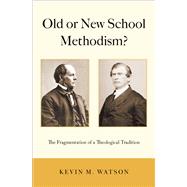On September 7, 1881, Matthew Simpson, Bishop in the Methodist Episcopal Church, in a London sermon asserted that, "As to the divisions in the Methodist family, there is little to mar the family likeness." Nearly a quarter-century earlier, Benjamin Titus (B.T.) Roberts, a minister in the same branch of Methodism as Simpson, had published an article titled in the Northern Independent in which he argued that Methodism had split into an "Old School" and "New School." He warned that if the new school were to "generally prevail," then "the glory will depart from Methodism." As a result, Roberts was charged with "unchristian and immoral conduct" and expelled from the Genesee Conference of the Methodist Episcopal Church (MEC).
Old or New School Methodism? examines how less than three decades later Matthew Simpson could claim that the basic beliefs and practices that Roberts had seen as threatened were in fact a source of persisting unity across all branches of Methodism. Kevin M. Watson argues that B. T. Roberts's expulsion from the MEC and the subsequent formation of the Free Methodist Church represent a crucial moment of transition in American Methodism. This book challenges understandings of American Methodism that emphasize its breadth and openness to a variety of theological commitments and underemphasize the particular theological commitments that have made it distinctive and have been the cause of divisions over the past century and a half. Old or New School Methodism? fills a major gap in the study of American Methodism from the 1850s to 1950s through a detailed study of two of the key figures of the period and their influence on the denomination.








